The growing demoviction crisis in Burnaby – a path forward
August 26, 2016 By Andrew Weaver 2 comments Affordability, Community Blog, Housing, Local Government, Social Development
Many might not be aware that an emerging, and entirely preventable, crisis in affordable rental accommodation is developing in the Burnaby Metrotown area. Perhaps the reason for this is that neither the government nor the official opposition has been raising this issue publicly. That’s one of the reasons why I accepted an invitation from the Metrotown Residents’ Association to tour the region on August 18th. While my visit to the area generated some excellent local media coverage in Burnaby Now and Vancouver 24 hours, I thought it was important for me to expand upon what I learned from my tour.
Background
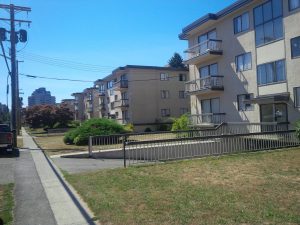 The issue that Burnaby is now facing has arisen from recent and imminent changes in policy. The first concerns legislative changes to the Strata Property Act that were passed in Bill 40, Natural Gas Development Statutes Amendment Act, 2015. An obvious question concerns why changes to the Strata Property Act were passed within a Natural Gas Development Statutes Amendment Act. There is, of course, no justifiable reason for this to have occurred. My own opinion is that it was done simply because Richard Coleman is the Minister of Natural Gas Development and also the Minister Responsible for Housing. By burying housing amendments in a natural gas bill the minister was able to deal with his entire portfolio at once. Bill 40 contained provisions that allowed Stratas to be dissolved (and hence the property sold) with only 80% instead of 100% of strata owners agreeing.
The issue that Burnaby is now facing has arisen from recent and imminent changes in policy. The first concerns legislative changes to the Strata Property Act that were passed in Bill 40, Natural Gas Development Statutes Amendment Act, 2015. An obvious question concerns why changes to the Strata Property Act were passed within a Natural Gas Development Statutes Amendment Act. There is, of course, no justifiable reason for this to have occurred. My own opinion is that it was done simply because Richard Coleman is the Minister of Natural Gas Development and also the Minister Responsible for Housing. By burying housing amendments in a natural gas bill the minister was able to deal with his entire portfolio at once. Bill 40 contained provisions that allowed Stratas to be dissolved (and hence the property sold) with only 80% instead of 100% of strata owners agreeing.
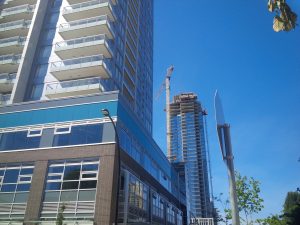 The second important policy change is that the municipality of Burnaby is moving towards rezoning low-rise areas to mid- and high-rise in and around the Metrotown skytrain station. While in and of itself this might sound like a fine idea — by increasing density you increase availability of housing stock — the reality is that it is compounding the affordability crisis in the area. Below I’ll attempt to outline why this is the case.
The second important policy change is that the municipality of Burnaby is moving towards rezoning low-rise areas to mid- and high-rise in and around the Metrotown skytrain station. While in and of itself this might sound like a fine idea — by increasing density you increase availability of housing stock — the reality is that it is compounding the affordability crisis in the area. Below I’ll attempt to outline why this is the case.
But first, I’d like to thank the Metrotown Residents’ Association for inviting me to participate on the tour. I’m also grateful to the residents of the Maywood, Marlborough and Cedar Place who took the time to speak with me.
The problem
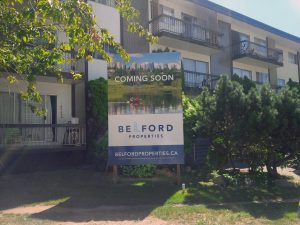 In recent years there has been a dramatic increase in the number of demolition permits that have been issued by the City of Burnaby. Older, low rise apartment buildings are being bought up at an alarming rate by developers whose intention is to demolish them and turn them into high end condominiums. Now in theory, as I note above this might sound like a great idea. The current stock of rental housing is dated and densification increases housing supply. But in reality, what is happening is that lower income rental housing is being replaced by higher income luxury condominiums. The result is that these lower income people are displaced and have nowhere to go. This is particularly troubling as Burnaby is ranked dead last in terms of affordability in the Canadian Rental Housing Index.
In recent years there has been a dramatic increase in the number of demolition permits that have been issued by the City of Burnaby. Older, low rise apartment buildings are being bought up at an alarming rate by developers whose intention is to demolish them and turn them into high end condominiums. Now in theory, as I note above this might sound like a great idea. The current stock of rental housing is dated and densification increases housing supply. But in reality, what is happening is that lower income rental housing is being replaced by higher income luxury condominiums. The result is that these lower income people are displaced and have nowhere to go. This is particularly troubling as Burnaby is ranked dead last in terms of affordability in the Canadian Rental Housing Index.
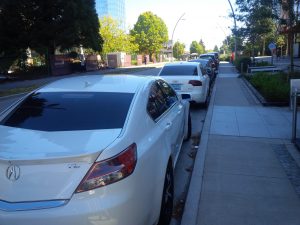 Metrotown mall and the Metrotown skytrain station are immediately adjacent to the neighbourhoods that are being affected. The proximity of rapid transit is particularly important to the residents living in the area who rely on it to get to their employment. At the same time, it was evident that the residents moving into the newer high-end condominiums are far more affluent. One can readily see this simply by looking at the cars parked along the residential streets immediately in front of the new constructions as opposed to the older ones.
Metrotown mall and the Metrotown skytrain station are immediately adjacent to the neighbourhoods that are being affected. The proximity of rapid transit is particularly important to the residents living in the area who rely on it to get to their employment. At the same time, it was evident that the residents moving into the newer high-end condominiums are far more affluent. One can readily see this simply by looking at the cars parked along the residential streets immediately in front of the new constructions as opposed to the older ones.
The response by Burnaby’s Mayor has been to blame the provincial and federal government for the problem. I find this odd in that zoning falls squarely within municipal jurisdiction and that municipalities have the power to create standards of maintenance bylaws which can incentivize upkeep of existing stock. They also have wide discretion as to how they use funds acquired from developers through the granting of increased density. Of course, the development of affordable rental housing, like Cedar Place in Burnaby, often requires the investment of resources from multiple levels of government, but it’s simply not good enough to pass the blame to someone else.
 Residents in the area that I talked to spoke of the constant stress that they are living with as they wonder if their apartment building will be next. They have tried to organize and meet regularly. Unfortunately, several of them told me that whenever they put up posters advertising their next gathering, the posters are quickly blacked out, like the example shown to the right.
Residents in the area that I talked to spoke of the constant stress that they are living with as they wonder if their apartment building will be next. They have tried to organize and meet regularly. Unfortunately, several of them told me that whenever they put up posters advertising their next gathering, the posters are quickly blacked out, like the example shown to the right.
So what is being done for those being evicted. The honest answer is that virtually nothing is being done. Burnaby council seems to be turning a blind eye as the demoviction problem gets out of hand. Rather than recognizing that the municipality has a moral obligation to look out for the best interests of their constituents, they seem content with the knowledge that property taxes and developer funds acquired through granting increased density will increase the City’s coffers. In fact, Burnaby’s Mayor has been reported to have said “he’s not about to give in to downloading what he says are provincial and federal responsibilities.”
The solutions
Burnaby council doesn’t have to look far to get a sense of what they might do. Under the leadership of Gregor Robertson the City of Vancouver has taken numerous steps to incentivize the development of rental houses. At the same time they successfully petitioned the provincial government to bring in enabling legislation that would allow Vancouver to introduce a vacancy tax that would penalize those purely speculating in the marketplace.
Burnaby did not. In fact, I wrote to Burnaby Mayor and Council in May asking them for their views on the vacancy tax. As I have written about earlier, the addition of the vacancy tax only into the Vancouver Charter and not the Community Charter as well (which other communities like Victoria and Oak Bay have been calling for) makes no sense at all. For example, on one side of Boundary Road (in Vancouver) a vacancy tax could be applied; on the other side of the street (in Burnaby), it would not. I never received a response or even an acknowledgement that my letter was received. In addition, Burnaby has the jurisdictional ability to slow the pace of demovictions to ensure that the construction of affordable, rental accommodation keeps pace with the increased densification.
Unlike the more progressive housing approach of Vancouver, Burnaby’s response to the affordability crisis has been to call on the BC government to allow municipalities to introduce “rental-only” zoning. The BC NDP have also been musing over the possibility of introducing legislation that would allow rental-only zoning options for municipalities. In my view this is not a solution. In fact, I would argue that this has the potential of being disastrous as it would potentially lead to the development of big city ghettos as found in other jurisdictions world wide.
Latest Posts
Recent Comments
- Adeola on The Paris Agreement is in trouble: UNFCCC needs to ratchet up their climate efforts
- rory murphy on The Paris Agreement is in trouble: UNFCCC needs to ratchet up their climate efforts
- Andrew Weaver on How can BC’s environmental organizations be more effective?
- Andrew Weaver on How can BC’s environmental organizations be more effective?
- Vince Fiorito on How can BC’s environmental organizations be more effective?

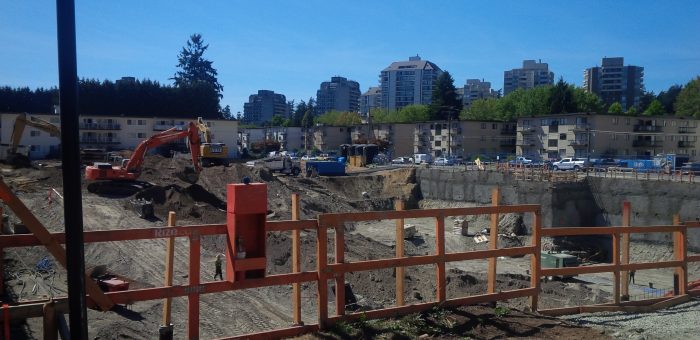



2 Comments
Andrew congratulations for taking time to address
a real crisis in housing that been growing for years now . I can’t suggest a workable solution
that would take the stress off renters becoming
homeless .
Iam afraid like most crisis govt address’s them after the damage is done BC Liberals style .
Again Andrew kudos for having a heart and soul
and your listened to by voters and legislators .
We have spoken via e-mail, i sent you a letter yesterday, many thanks for your response, the answer for Burnaby is people, get off your asses, vote out you fat cat Mayor and wife and vote out all NDP and Liberal MLA’s and vote GREEN, Green for the green light towards positive change for Burnaby, kindest regards, Walter Muller